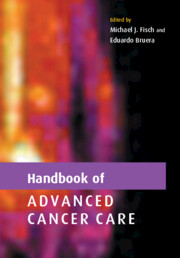Book contents
- Frontmatter
- Contents
- List of contributors
- Preface
- Acknowledgements
- PART I General concepts in oncology
- Part II Primary tumors
- 17 Lung cancer
- 18 Breast cancer
- 19 Colorectal cancer
- 20 Prostate cancer
- 21 Pancreatic and hepatobiliary cancer
- 22 Anal cancer
- 23 Esophageal and gastric cancer
- 24 Head and neck cancer
- 25 Kidney cancer
- 26 Bladder cancer
- 27 Ovarian cancer
- 28 Gynecologic malignancies: endometrial and cervical carcinoma
- 29 Testicular cancer
- 30 Unknown primary site cancer
- 31 Mesothelioma
- 32 Adult soft tissue sarcoma
- 33 Osteosarcoma and Ewing's sarcoma
- 34 Melanoma
- 35 Primary brain tumors
- 36 Thyroid and adrenal cancer
- 37 HIV-related cancer
- 38 Hodgkin's and non-Hodgkin's lymphoma
- 39 Leukemia, myelodysplastic syndrome and myeloproliferative disorder
- 40 Multiple myeloma
- Part III Management of specific symptoms and syndromes
- Index
- References
17 - Lung cancer
Published online by Cambridge University Press: 04 August 2010
- Frontmatter
- Contents
- List of contributors
- Preface
- Acknowledgements
- PART I General concepts in oncology
- Part II Primary tumors
- 17 Lung cancer
- 18 Breast cancer
- 19 Colorectal cancer
- 20 Prostate cancer
- 21 Pancreatic and hepatobiliary cancer
- 22 Anal cancer
- 23 Esophageal and gastric cancer
- 24 Head and neck cancer
- 25 Kidney cancer
- 26 Bladder cancer
- 27 Ovarian cancer
- 28 Gynecologic malignancies: endometrial and cervical carcinoma
- 29 Testicular cancer
- 30 Unknown primary site cancer
- 31 Mesothelioma
- 32 Adult soft tissue sarcoma
- 33 Osteosarcoma and Ewing's sarcoma
- 34 Melanoma
- 35 Primary brain tumors
- 36 Thyroid and adrenal cancer
- 37 HIV-related cancer
- 38 Hodgkin's and non-Hodgkin's lymphoma
- 39 Leukemia, myelodysplastic syndrome and myeloproliferative disorder
- 40 Multiple myeloma
- Part III Management of specific symptoms and syndromes
- Index
- References
Summary
Introduction
Lung cancer remains the leading cause of cancer-related death in North America and Europe, and more people die of lung cancer than colon, breast, and prostate cancer combined. During 2000, there were predicted to be about 164 100 new cases of lung cancer, 89 500 men and 74 600 women. The increase in death rate is slowing, but has not begun to drop.
More than 80% of lung cancer deaths are attributable to smoking, and only asbestos exposure and family history enhance risk substantially. Fundamentally, lung cancer occurs as a result of deregulation of normal gene expression. Molecular changes that have been demonstrated in lung cancer include activation of oncogenes such as ras, myc, bcl-2, and c-erbB-2; loss of tumor suppressor genes such as p53, RB, and p16; and alterations in angiogenesis such as vascular endothelial growth factor (VEGF) overexpression in primary lung tumors. All represent potential therapy targets.
Categories/staging
The diagnosis is established by examination of either cytology or surgical pathology specimens. Lung cancer is rarely if ever treated without a specific tissue diagnosis. The most widely accepted histologic classification for lung tumors is that proposed by the World Health Organization (WHO) and revised in 1999. It includes four major types: squamous cell, adenocarcinoma, small cell, and large cell.
Small cell lung cancer (SCLC) is the more aggressively spreading tumor with neuroendocrine features and accounts for 20% of all lung cancers.
- Type
- Chapter
- Information
- Handbook of Advanced Cancer Care , pp. 137 - 149Publisher: Cambridge University PressPrint publication year: 2003



